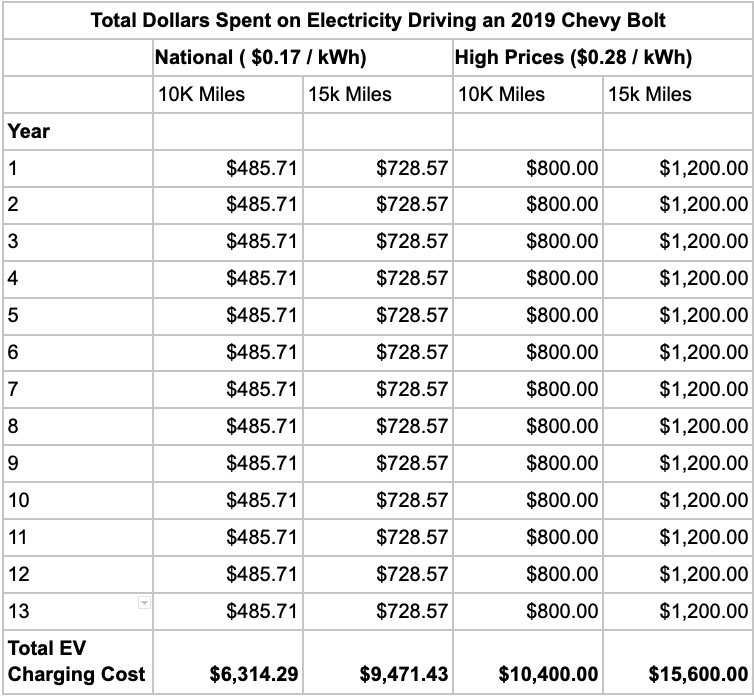
Should You Buy an Electric Car?
With the ever-increasing price of gasoline and the greater availability of electric vehicles, you might be asking, “should I buy an electric car over a gas car”
In this post, I’ll try to answer that question and see at what price it makes sense to buy an electric car over a gas car. Here’s how this article is broken down:
- Assumptions used in the calculations
- Detailed results
- Conclusions based on where you live in the United States.
Assumptions used in the calculation
To see what’s better, an electric car or a high-mileage gas sedan, we’re going to compare the initial cost difference in the car price (since most EVs on the market today are more expensive than a similar gasoline car) to the cost savings you will get by not filling up a gasoline tank.
Here are the factors we will use to set up the calculation:
- The cost of gasoline will always be rising due to the reduction of the supply of gasoline and inflation. To account for this we will assume that the price of gasoline will increase every year by 2%. [3]
- For this calculation I will consider 3 geographic areas when looking at gas prices [1]:
- National Average: $3.16 per gallon of gas
- West Coast / East Coast States: $3.85 per gallon of gas
- Southern States: $2.70 per gallon of gas
- It’s my personal belief that you should always buy a pre-owned vehicle. To compare against an electric car, we will use the cost of a 2020-2022 pre-owned Honda Civic (S-tier car). This car has a typical MSRP of $22,000 before taxes and fees and has an advertised 29 miles per gallon in city driving conditions. We will use the city mileage since you could only get the advertised highway mileage if you only ever drove 55 miles per hour on the freeways. No one drives that slow.
- We’ll assume that you own the car for 13 years, and we’ll use 2 different mileage scenarios:
- You drive 10,000 miles a year (low mileage)
- You drive 15,000 miles a year (moderate – high mileage)
- When driving an electric car, the miles you drive aren’t free. If you don’t have access to a free charging station at work, then you will need to pay for the electricity at home to charge your car. We’ll assume two different prices for electricity:
- $0.17 per kilowatt hour (national average)
- $0.28 per kilowatt (upper end / coastal states)
- When calculating “fuel economy” for electric cars we can’t use miles per gallon since they don’t use gas. Instead, we will use miles per kilowatt hour. To be conservative we will use 3.5 miles per kilowatt hour.
- For the Chevy Bolt (A-tier car), the electric fuel economy is around 3.5 miles per kilowatt hour [2]
- For the Tesla Model 3 (S-tier car), the electric fuel economy is around 4.1 miles per kilowatt hour [2]
- I don’t believe we will see electricity prices increase over time as we are seeing with gas prices. Because the U.S. government is pushing for wider adoption of renewable energy such as solar and wind, we may potentially see the cost of electricity going down. Because of this, I will not take into account the increase in electricity prices.
Finally, because we will pay more for an EV today, whereas the savings we get in not paying for gas is in the future, we will use a risk-free rate of 4% to discount the savings in gas into today’s dollars. This is because money today is worth more than money in the future. Then we can use that amount to see how much of a premium is acceptable when buying an electric car today when expecting savings in the future.
Detailed Results
The table below shows how much you would spend on gasoline if you drove a 2020 Honda Civic for 13 years. Depending on where you live and how many miles you drive, your total cost would range from about $16000 to about $32000.

The table below shows how much you would pay in electricity to charge a Chevy Bolt, or a vehicle with similar capacity and efficiency, over 13 years. Depending on how much you drive and how much you pay for electricity, you would end up paying between $6000 and $15,600.


If we now take the difference between the total price you would pay for gas and the total price you would pay for electricity to charge your EV, we get the potential savings over the span of 13 years. If we discount that savings back to today’s dollars, then add that to the MSRP for a certified pre-owned Honda Civic, we can get approximately the break-even price we should pay for an electric vehicle.
Depending on how much you pay for gas and electricity and how much you drive, the acceptable price to pay (MSRP before taxes and fees) for an electric car is somewhere around $26,000 and $32000.
Conclusions based on where you live in the United States.
If you live in a state where the gas price is average
If you consider the national average gas prices and you drive about 10,000 miles a year, then you should pay only $27,814 for an electric vehicle today to break even in gas costs you would incur if you had just bought a pre-owned Honda Civic. If you drive 15000 miles a year, then if you spent $30,700 for an electric car you would break even in 13 years.
If you live in a state where gas prices are higher than average
The price you should pay for an electric car today is a little higher if you live in a coastal city with higher gas prices and electricity prices. You should only pay $28,500 if you drive less than 10,000 miles and only $31,700 if you drive 15,000 miles a year.
If you live in a Southern State where gas is cheap
If you live in southern states where gas is much cheaper, it only makes sense to buy an electric vehicle for only $26,400 if you drive 10,000 miles a year and only $28,600 if you drive 15,000 miles a year.
Other things to consider
It’s also important to think of other factors that weren’t considered in this calculation. For example, electric vehicles are better for the environment since they don’t contribute much to the pollution of the atmosphere. Also, with an electric vehicle, you will have much fewer maintenance costs (fewer oil changes, transmission fluid changes, spark plug changes, etc). Also, it’s important to note that electric vehicles are supposed to last longer than conventional gas vehicles since they have fewer moving components. It’s estimated that EVs could last up to 300,000 miles compared to gas vehicles.
But based on today’s gas prices, electricity prices, and used car prices, it seems like you should only pay somewhere between $26000 to $32000 for an electric car. With the incentives recently announced with Biden’s Inflation Reduction act, you may be able to get a tax credit for electric vehicles that makes them more affordable.
[1] https://gasprices.aaa.com/
[3] https://www.eia.gov/dnav/pet/hist/LeafHandler.ashx?n=pet&s=emm_epm0_pte_nus_dpg&f=a
